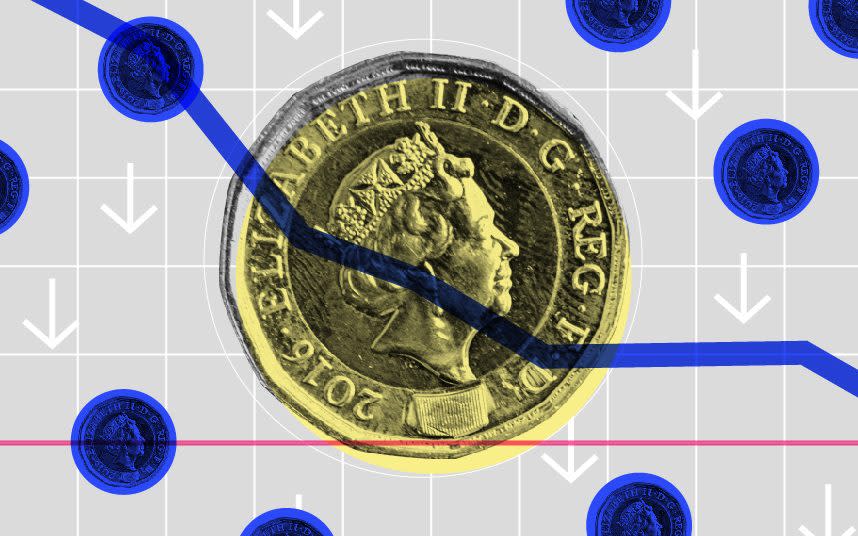Inside the Bank’s battle to save Britain from a plunging pound

Britain’s currency is getting slaughtered on international markets as investors question the conviction of the Bank of England to keep raising rates.
Down nearly 10pc since the start of the year, the pound has ended up in an unenviable club of losers from the world’s new “reverse currency wars” - a term which refers to central banks’ efforts to support their respective countries’ international purchasing power.
Among major currencies, only Japan’s yen, Sweden’s krona and Norway’s krone have performed worse than sterling so far this year. Those, however, are united by their central banks’ hesitancy on increasing interest rates, which typically supports the value of a domestic currency by making it more lucrative to hold.
A weak pound threatens to drive up the cost of imports, piling more inflationary pain on households.
While some experts have recently dubbed the pound an “emerging market” currency, the battle to save sterling could be won relatively quickly.
At a speech last Monday, Catherine Mann, one of the newest members of the Bank’s Monetary Policy Committee (MPC), suggested a rapid increase in rates could prop up the pound, providing short-term economic relief.
The former global chief economist at Wall Street giant Citibank said going big on rates “reduces the risk that domestic inflation already embedded is further boosted by inflation imported via a sterling depreciation”, and could be followed by subsequent easing later on.
Mann’s intervention represented a radical shift in tone for the Bank, defying claims that the present price crisis is beyond its control – including by Governor Andrew Bailey, who made headlines last month after saying he felt “helpless” to combat spiralling prices.
“[Pound strength] is one of the few things in the inflationary story that the Bank of England can actually do something about,” says James Smith, an economist at ING.
The currency has fallen 9.5pc against the dollar since the start of the year, while the yen has fallen 14.7pc. The krona and krone are 11pc and 11.4pc lower. Against a basket of global currencies, the dollar has risen about 7.1pc over the same period.
Yet unlike the central banks presiding over severe currency falls, Threadneedle Street hasn’t been sitting on its hands. The MPC has moved relatively fast in increasing rates, getting ahead of the European Central Bank and US Federal Reserve with a rise last December, followed by four consecutive increases.
Many other central banks are still just waking up to the sudden importance of protecting their exchange rates.
“We're in a very different regime now for policymakers,” says Michael Cahill, a foreign exchange strategist at Goldman Sachs.
The Fed’s hawkish swivel earlier this year has dealt a stunning blow to the global economy. Equities, bonds, currencies – and other central banks – are reeling as they are unhooked from two years of monetary morphine.
“The basic problem is, at some point, the Bank is going to find it hard to keep pace with the Fed,” says Smith.
As Powell and the Federal Open Market Committee (FOMC) rapidly tighten rates – even putting huge, 0.75 percentage point increases on the table – the dollar has rapidly gathered strength, piling pressure on the pound.
The number that matters to the MPC above all others is 2pc: the Bank’s target for inflation, which it has broadly met in the quarter-century since its establishment, but is currently being blown apart. Consumer prices rose 9.1pc in the year to May, and are expected to top 11pc this autumn.
Increasing rates is seen as a medium-term tool to achieve this target, because the impact typically takes 12 to 18 months to filter through. It expressly doesn’t target exchange rates.
While the MPC members usually avoid directly criticising each other in public, Huw Pill, the Bank’s chief economist since last autumn, offered about as close as the committee ever gets to a rebuttal in the wake of Mann’s speech.
“I worry that thinking that we can use that very blunt tool to do many things – stabilise the exchange rate in the short term, and ensure that any weakness in output is going to be weighed against and so forth and so on,” he said on Tuesday, “that can distract us from the task we’ve been given to do, and end up meaning that we are much less effective in achieving that task.”
Watchers took it as a shot at Mann, to keep her eyes on inflation.
“The currency is a channel the BoE has to take account of when setting policy, but Mann’s speech unfortunately leaves the impression that this is where the main focus should be at the moment,” explains Allan Monks, UK economist at JP Morgan.
“The weaker pound accounts for a relatively small part of the UK’s inflation problem, which is more about sharp increases in commodity prices and a tight labour market that is pushing wage growth and domestically generated inflation higher.”
The apparent schism between Pill and Mann, two of the MPC’s two most recent joiners, marks a shift for the nine-member panel, which has faced repeated allegations of succumbing to ‘groupthink’ despite a run of divided decisions.

“It’s really healthy that they have different points of view, and they bring different ideas to the table,” says Melanie Baker, senior economist at Royal London Asset Management.
Mann has a glittering CV, including as chief global economist at Citi, chief economist of the Organisation for Economic Co-operation and Development (OECD), and a White House advisor. Pill joined the Bank in September from Harvard Business School and was chief European economist at Goldman Sachs.
Both have surprised watchers. Shortly after arriving at the Bank, Pill said he identifies as “an acolyte” of Otmar Issing – the German inflation hawk who was the ECB’s first chief economist. But in practice, he has been an advocate of a much slower, more gentle approach to rates.
Mann, in contrast, was presumed by many to land at the middle of the MPC spectrum, but has proved to be a hawk. Mann was in the defeated camp who voted for a half-point rate rise earlier this month.
“She's got a few quite hawkish arguments up her sleeve,” says Melissa Davies, chief economist at broker Redburn. “It has been a bit of a surprise, because before she joined the MPC, she was sounding a lot more sanguine about the long-term outlook for inflation.”
Now, Mann has now taken a big swing at the status quo, but whether her suggestion of rapidly increasing rates to prop up the pound would actually work is a different question.
There’s also a danger that a foray into steering the currency would damage long-term confidence in the Bank’s focus, even if it could offer some short-term pain relief.
“I don't think shock and surprise is the way we would ideally want monetary policy to operate,” says Jagjit Chadha, director of the National Institute for Economic and Social Research.
Rapid rate hikes could also have other unwanted repercussions: potentially propping up sterling, but at a severe broader economic cost. It comes at a particularly crucial point when the UK is teetering on the edge of a recession.
“The option to reverse later doesn't work so well if you’ve unleashed a negative credit cycle and all those sorts of things,” says Davies. “It becomes quite costly.”

 Yahoo Finance
Yahoo Finance 